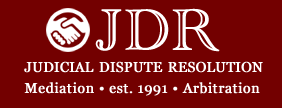by Thomas D. Weaver, Esq.
“To the uneducated, an A is just three sticks.”
Education gives us the ability to see things in a different light. It is therefore the key to gaining a better understanding of the issues in any dispute, including realizing that certain issues even exist -- but in order to achieve a successful mediation, educating the mediator is only 25% of the process. This article suggests that the education process begins as soon as you have the case in your hands, not on the day of mediation.
Client education - keeping the client apprised is an essential part of client control. Naturally, this starts with the very first client contact, in which it should be made clear that case evaluation is an on-going process, from both a liability and damages aspect, so that clients are not surprised down the road when you tell them that things have changed a bit (or a lot). A substantial encumbrance to settlement can be a client who is shocked to hear for the first time at mediation that the case has evolved in a way which is at odds with their original perceptions.
For instance, if you represent the plaintiff in a medical malpractice case, be sure he knows from the beginning about the MICRA cap on general damages. Conversely, if you represent a healthcare provider, be sure he knows that the MICRA cap does not apply to economic damages.
We lawyers all know that any settlement is a compromise, and client education includes explaining that compromise is an integral part of the mediation process. Discovery can and often does change those areas where compromise should be considered, so keeping the client up to date on discovery will ease your ability to later discuss which issues in the case are strengths, and which ones present potential weaknesses.
Self education - Of course, it is not possible to properly educate the client unless the lawyer can first make a truly objective evaluation. In a majority of cases, this usually requires reliance on consulting experts. In that regard, you know that there is no such thing as a “slam dunk”, no matter what your expert may initially tell you. Therefore, the attorney must continue to test his expert’s opinions as new information becomes available. Start to think like your opponent: how best would you cross-examine your own expert? An essential part of an advocate’s job is recognizing that a jury or arbitrator will try to understand each side’s position. Stepping into your opponent’s shoes will help you develop both a best-case and a worse-case scenario in assessing potential settlement. Therefore, you may wish to consider using a note pad to write down and calculate your best case and worse case numbers and let the client see the analysis before you go into session.
Opposing counsel education - if you want to settle, you have to give your opponent reasons why their case is not as strong as they may think. And although lawyers often provide the mediator with a “confidential” brief, why not make sure that your opponent gets the same “good stuff”? It is safer to assume that opposing counsel may not have thought of these points. And if they have, it doesn’t hurt to remind them. If you wait until the day of mediation to point out certain things to the other side, they may merely reject your position out-of-hand, because they have not had time to seriously consider what may be new information for them. Certainly, there may be some gem that you do not wish to immediately share, in which case you can send your mediator a separate confidential communication.
Mediator education - Unlike arbitration, ex-parte communication with the mediator is actually encouraged. Obviously, this is what goes on during your separate caucuses during the mediation itself, so if you have special concerns that you would like to discuss ahead of time, most mediators are willing have a private phone conversation with you pre-mediation. Examples would include informing the mediator of your client’s highly emotional state, or a special or unique relationship between the parties which would assist the mediator in better understanding the nature of the dispute – but of course keep in mind that the mediator’s time is valuable too, so be sure to stay focused on the specifics of the call.
If you are the defense, be sure to inform the mediator up front if you will be requesting a confidentiality clause in your settlement agreement, or any other special conditions which a full settlement will require. If you represent the plaintiff, be sure to inform your client of the fact that the defense often asks for confidentiality. Sometimes, this is not a big issue for the plaintiff, but once in a while this can become a deal-breaker, especially if sprung on the plaintiff at the last minute. A mediator can explore this issue if the parties have reached an agreement in principal, but sometimes it gets left out of the negotiations even at the end, and the plaintiff first learns of it when he is given the formal settlement agreement for his signature.
Sixty years ago, National Book Award winner Ralph Ellison wrote that “Education is all a matter of building bridges”. In order to achieve a successful mediation, education can certainly help to span the gap that has been separating the parties.
Tom Weaver practiced tort law for over 35 years before becoming a full-time mediator and arbitrator.

